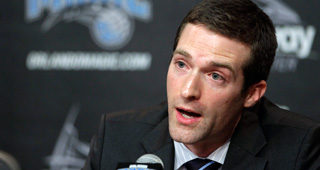Earlier this month, the Orlando Magic decided to give Ben Gordon a two-year deal worth $9 million. While there are many surprising things about cashing out a player who got cut by a playoff team that desperately needed production at his position, some of the more interesting ones come from the reportedly non-guaranteed second year of the contract.
One of the currently in vogue CBA tricks that has become more prominent this league year, non-guaranteed contracts carry a few fun benefits teams can use to their advantage. Mark Deeks wrote a great piece on how this can happen if you want to read more in-depth, but the general concept is that non-guaranteed contracts do not necessarily require teams to decide on a player’s next season before June 30 like team options and also can be used as true cap filler to make a trade work under league rules without the receiving team having to actually pay any money to those players should they prefer that.
Think about the Celtics and Keith Bogans- even though he was necessary flotsam in the huge and successful trade with Brooklyn last summer, Boston actually had to pay him millions of dollars during the 2013-14 season.
This summer, the New Orleans Pelicans ran into trouble clearing the necessary cap space to acquire Omer Asik so they ended up picking up enough non-guaranteed contracts to fulfill trade rules. Simply having those contracts in existence creates potential value for the league, at least under the current Collective Bargaining Agreement. In fact, we could very well see non-guaranteed contracts play a major role in a Kevin Love trade since Minnesota appears to desire unloaded additional contractual baggage in the trade that sends away their best player. Cleveland already acquired three from Utah, giving up Carrick Felix and a second round pick to do so.
While these recent examples show the potential utility of a deal like Ben Gordon’s, the particulars of Orlando’s cap situation substantially diminish his usefulness to the team that just overpaid him. While non-guaranteed contracts help make trades happen, cap space works even better if available because it has no strings attached. I liken this to having a $20 gift card or just having $20- while both are nice, having less limitations in terms of how to spend the money makes the cash more desirable. At this point it looks like Orlando will have plenty of cap space next summer. Their astonishing $14.2 million on the cap this season for players not on their team anymore (Glen Davis, Al Harrington, Jameer Nelson and Anthony Randolph) means that it would take major pay raises from the guys currently on the team to change that reality and factoring in the cap holds for Nikola Vucevic and Tobias Harris who are on the last year of their rookie deals they should still have close to max room. That means the Magic are unlikely to be in the ideal situation to maximize a non-guaranteed contract.
Fortunately for Orlando, the non-guaranteed year will still have value to other teams. We just saw the Jazz (a team with cap space) pick up a player and a pick in a similar situation so the Magic can hope for that kind of a return. Something to consider though is that the most useful spot for non-guaranteed deals is when teams are butting up against the salary cap so their trade partner might need to give up some actual salary to make a trade work. It presumably would be worth the cost but another factor that affects the net value of a potential transaction.
We will have to wait almost a year to see what happens here but it should be fun to track the value of an asset that has far more usefulness to other teams.



